Literary Citizenship and the Power of Participation
Making connections and building a writing career
When I was a relatively young writer, I did what young writers are “supposed” to do and started submitting poems, stories, and essays to literary journals. It helped to hear all the rejection stories but nothing really changed for me (that is, I kept getting rejections) until I started working at Cinco Puntos Press, a small independent literary press, and I was in the same position that all those editors who were rejecting my work were in. It helped me to understand something fundamentally important: “They are just like me.” (Cue in the photos of various celebrities doing normal human things and the caption, “Hollywood stars: they’re just like us.”)
Not a lot changed in terms of my skill level, talent, or execution, though I was persistent in working for several hours every day, perfecting the pieces I was working on. BUT I started submitting with a fundamentally different attitude. I understood that the person who was accepting or rejecting was a flawed human being, just like me. They might be right to reject my piece, but they might be wrong, and at the end of the day, it didn’t really matter: if they accepted it, it wasn’t the biggest deal in the world. It was just another step on a long, arduous hike up a supremely tall and rugged mountain.
That attitude changed everything. Suddenly, I started getting handwritten rejections and won a few small awards for unpublished pieces (which I had submitted with the requisite fees). I kept at it, and a couple of years later, agent in hand, I had a book contract from Knopf.
That feels like ages ago but I tell young writers all the time to do two things:
1) cultivate an attitude of belonging (not a diva-like entitlement but nevertheless entitlement)
and
2) develop relationships with people in the industry
The former is necessary for the latter, and the latter is necessary for publishing. I don’t know many—if any—writers who were plucked out of total obscurity and published accordingly. Relationships form the basis for publishing, for better or worse, and the more genuine connections you form, the more successful you will be—at least for publishing pieces. There is obviously more to success in terms of sales but that’s a different topic.
I’ve been absent for a couple of weeks due to precisely this issue: building relationships. Catalyst Press’s flagship imprint publishes primarily African writers and I find myself traveling often to cultivate those relationships. I now also have many American authors and authors around the world, and while it can be a bit exhausting making those personal, in-person connections, I try to do it as much as possible when I’m going to be in a part of the world where one of them lives.
A few examples of the way personal connections have led to contracts with some of my authors:
It’s because I knew a friend of Bridget Krone that I was slipped a copy of Bridget’s manuscript Small Mercies “on the sly.” Bridget had received so many rejections for her children’s novel that she had lost all belief in it. I never would have seen that manuscript if our mutual connection hadn’t handed me a paper copy. I knew a few pages in that I would probably publish it. After I acquired Small Mercies, we sold the Commonwealth rights to Walker Books, probably the best-known UK publisher of children’s books; the mainland Chinese language rights; Taiwanese Chinese rights; Spanish rights; and audio rights. All because of a mutual friend.
I don’t remember who introduced me to iconic children’s illustrator and writer Niki Daly, but as a result of someone saying, “You two would like each other,” we had coffee together one morning in Kleinmond, South Africa. No plans for publishing, he wasn’t submitting to me, I wasn’t expecting him to submit to me, but a couple years after that delightful first conversation, we worked out a deal for me to publish him into North America. Now I’ve been fortunate enough to publish the last five of Niki’s books before he died, and I’m publishing his son Leo Daly’s debut picture book, The Giant and the Olive, in early 2026.
Friday, I traveled to the small town of Nxuba, South Africa for the start of the Karoo Writers’ Festival, an annual festival that celebrates the life and literature of Olive Schreiner (of Story of an African Farm fame). I don’t know whether I met somebody I’ll publish down the road, or not, but I do know that I saw some lovely local young people getting up and reciting their poetry, participating in a local literary community with their friends and teachers. And I learned a lot about an iconic writer whose work transcends her time. Who knows where that will lead, for me as a publisher, for them as writers?
This is how it starts. Small and local. It starts with participating in book fairs and literary festivals, attendance at writers’ forums, going to book readings and book signings. That is, it starts with becoming a good literary citizen. Talent and skill at this stage are less important, though it is of course critical to perfect your voice, to practice, to begin to develop what Michael Ventura called “the talent of the room.”
From there, spread outward and begin to make contacts small and big. Don’t fawn over the big names. Don’t assume that a person you’re talking to, who expresses interest, is nobody important. Everybody is important, from the “smallest” or “youngest” reader to the most influential literary agent, and many of the biggest “big mouths,” who are in a position to make decisions about later publishing your work or for helping to make it successful, are not ego driven and don’t indicate to you or anybody else how important they really are.
You cannot become a good literary citizen in a calculated, transactional way. You’re participating in this community because you are a writer and writers participate in the community of publishing, just like architects and builders need to know carpenters, electricians, and plumbers. Writers may be solitary creatures during the act of writing, but to succeed in this business, you have to leave the room and get out into the world, meeting people in real life.
So get to it.






Sage advice!